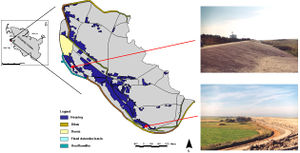Difference between revisions of "Template:This weeks featured article"
From Coastal Wiki
(→science-policy interactions) |
(Flood risk analysis study at the German Bight Coast) |
||
| Line 1: | Line 1: | ||
| − | == | + | ==Flood risk analysis study at the German Bight Coast== |
| − | [[Image: | + | [[Image:Study_area.jpg|thumb|300px|left|'''Figure 1: Map and coastal defence structure of the pilot site St. Peter-Ording.''']] |
| − | The | + | The [[Intergovernmental Panel Climate Change Fourth Assessment Report (2007) | 2007 report of the Intergovernmental Panel on Climate Change]] (IPCC 2007<ref>IPCC (2007): Climate change 2007: The physical science basis - Summary for policymakers. Intergovermental Panel on Climate Change (IPCC), Genf, 21 p.</ref>) made evident that an ongoing global [[climate change]] will cause increased storminess and [[sea level rise]] in coastal zones. There is little doubt that the North Sea will also be affected by an accelerating rise of the sea-level, an increase in extreme weather events and a greater tidal range. In order to be prepared for future conditions, prevention measures have to be improved and methodologies to assess and manage upcoming risks have to be further developed. As there are still deficits in assessing the full range of [[flood]] impacts, new approaches have been developed for hazard analysis, [[vulnerability]] assessment, and flood risk management in the framework of the EU-project [http://www.floodsite.net FLOOD''site''] (Integrated Flood Risk Analysis and Management Methodologies). In order to apply some of these new methodologies, a pilot site application was conducted for the community of St. Peter-Ording at the German North Sea Coast combining failure probabilities of the [[coastal defence]] system with micro-scale socio-economic vulnerability analysis. |
Revision as of 13:54, 12 November 2008
Flood risk analysis study at the German Bight Coast
The 2007 report of the Intergovernmental Panel on Climate Change (IPCC 2007[1]) made evident that an ongoing global climate change will cause increased storminess and sea level rise in coastal zones. There is little doubt that the North Sea will also be affected by an accelerating rise of the sea-level, an increase in extreme weather events and a greater tidal range. In order to be prepared for future conditions, prevention measures have to be improved and methodologies to assess and manage upcoming risks have to be further developed. As there are still deficits in assessing the full range of flood impacts, new approaches have been developed for hazard analysis, vulnerability assessment, and flood risk management in the framework of the EU-project FLOODsite (Integrated Flood Risk Analysis and Management Methodologies). In order to apply some of these new methodologies, a pilot site application was conducted for the community of St. Peter-Ording at the German North Sea Coast combining failure probabilities of the coastal defence system with micro-scale socio-economic vulnerability analysis.- ↑ IPCC (2007): Climate change 2007: The physical science basis - Summary for policymakers. Intergovermental Panel on Climate Change (IPCC), Genf, 21 p.
